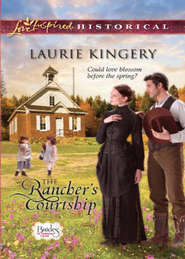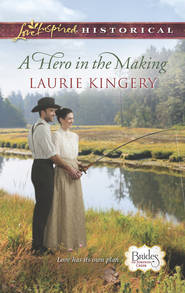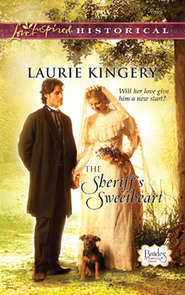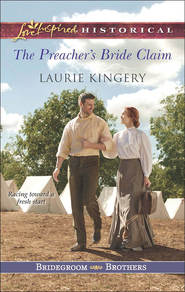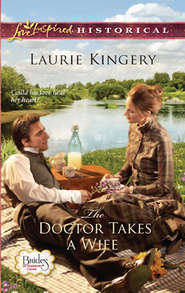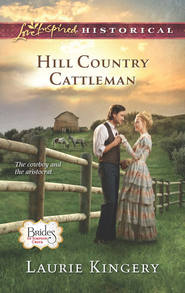По всем вопросам обращайтесь на: info@litportal.ru
(©) 2003-2025.
✖
Hill Country Christmas
Настройки чтения
Размер шрифта
Высота строк
Поля
“Howdy, stranger. I sure was thankful to hear you coming. I think this arm is broke. I tried walking, but I got to feelin’ kinda fainty-like.”
Jude dismounted. “What happened?” he asked, going toward the man.
“I rode out here just to have a glimpse at my old spread. Used t’ live here afore me and the missus got too old t’ be ranchin’ anymore and moved t’ town. I sold my acres to the neighboring rancher, even though I never thought much a’ Dixon Miller. Anyway, I was ridin’ along an’ someone fired a shot—not at me, I think, but real close t’ the road, like. My fool horse was so spooked, he threw me and took off,” he admitted with a rueful grin. “Didn’t see him run past ya, did ya?”
Jude admitted he hadn’t.
“Don’t know where he’s got to, though it wouldn’t surprise me none if Miller’s boys find him and put him in with their stock. All I wanted was just a glimpse of our old home,” he said wistfully, then he straightened. “James Heston’s the name,” the old man said, extending his other hand, though he grimaced when he loosed his careful hold on the broken right arm. His face was craggy and lined but his gaze honest and direct.
“Jude Tucker. Let me help you onto Shiloh, here, and we’ll get you into town. Is there a doctor in Llano Crossing?”
The old man gave a mirthless snort. “None I’d send my worst enemy to, let alone go myself. There isn’t any need, anyway. Nothing feels out of place.” He felt along the forearm as if to demonstrate, wincing as he did so. “My ranch is just over that ridge. If you could just help me get home, Jude Tucker, I’ll be fine. And I’m sure my missus will give you supper by way of thanks.”
Jude assisted Heston to mount, thankful that Shiloh was even-tempered enough not to mind a strange rider, especially one who trembled slightly with the effort to raise his foot to the near stirrup. Then he walked alongside the buckskin in the direction of town.
They found Heston’s horse halfway back. The beast had apparently cut across country and was calmly grazing. Jude mounted him rather than put Heston to the trouble of changing horses, and they rode on to Heston’s house.
“That was delicious, Mrs. Heston,” Jude said, two hours later, as he pushed himself back from the table and the remains of a dinner of fried chicken, black-eyed peas, corn bread and peach pie—it seemed as if he was fated to have peach pie today, even though he’d declined it at the hotel.
The comfortably plump woman with strands of iron-gray hair coming loose from her bun beamed at him. “My goodness, Mr. Tucker, it was the least I could do after you were kind enough to bring my Jim home,” she said, bestowing a smile of immense warmth. “It’s such a rare treat to have company, in any case.”
“My wife is the best cook in these parts,” James Heston bragged. He hadn’t eaten that much himself, even though his wife had cut up his chicken and buttered his corn bread so that left-handed eating would be easier. His forearm was splinted now and lying in a makeshift sling of bright yellow calico, so perhaps the pain had dimmed his appetite.
She beamed. “Thank you, Jim. And what brings you to these parts, Mr. Tucker?”
“Just passin’ through,” he said. “I’ve been mining out in Nevada, but I had to come here…on some business,” he said, deliberately being vague. “I’ll be heading west again, soon as I raise a little traveling stake.”
Heston’s eyes met those of his wife. “Lookin’ for work, are you?” Heston inquired.
Jude shrugged. “I might be. I’ve done some carpentry, but I can turn my hand to most anything.”
“I’m going to need some help around here with the chores for a little while, till this bone knits itself back together. And you saw when we came in from the barn that I’m in the midst of addin’ on a room to the back.”
Jude nodded. Heston was about halfway through framing the addition, from the looks of things.
“We couldn’t pay you much, but we’d include room and board for as long as you want to stay. It’d certainly be cheaper than the hotel or the boardinghouse.”
Jude was aware that both the elderly man and his wife were holding their breath awaiting his answer. Surely their offer was an answer to a prayer he hadn’t even prayed yet.
“Thank you. I’d be pleased to do that for a spell, Mr. Heston,” he said, humbled by their kindness to a stranger.
Chapter Five
“Who can find a virtuous woman?” Delia read in the last chapter of the book of Proverbs three mornings later after Tucker had come to see her. She loved to read her Bible there, with the sun just beginning to warm the worn wood of the rocker. Even the raucous cries of the grackles, hunting bugs among the grass, didn’t usually bother her, though they could be disruptive when she tried to pray!
She was getting mighty tired of drinking her coffee without sugar, Delia mused as she sipped the unsweetened brew. She had used the very last of the sugar yesterday, so a trip back into town to sell her eggs was a must. And maybe while she was in town, Amos Dawson would see her going by the bank and run out to let her know the certificate had been confirmed by the bank in Nevada.
Delia, time enough for worldly business later. The Lord deserves your full attention right now. She could almost hear her grandfather’s cracked voice saying the words.
“For her price is far above rubies.” Why, it wouldn’t be long until she could buy rubies—or at the very least, those garnet earbobs in the window of the mercantile that she had been yearning for forever.
Oh, please, God, don’t let anyone buy them before the bank in Nevada releases my money! Wouldn’t it be wonderful to march right over to the mercantile and make the garnet earbobs my very first purchase?
But then in her head she heard, “For the love of money is the root of all evil.”
The voice was so clear that she had to look around her to make sure Reverend McKinney wasn’t standing behind her.
But how could it be wrong to rejoice in the windfall her father had provided for her? Her grandfather and she had had to skimp and save for so many years—surely the only thing she needed to regret was that he wasn’t here to be given the comforts she could now provide!
Her eyes skipped down the page of her grandfather’s well-worn Bible with his many handwritten notations in the margins to the verse: She consider-eth a field, and buyeth it.
Perhaps she’d be considering a field soon, though she’d rather plant a house on it than the vineyard the verse went on to mention. A big, fine, white-painted frame house, with lots of rooms. She’d have one room just to store her clothes in, another for her jewelry, another to entertain her many guests—perhaps even a ballroom on the second floor, with a veranda extending around at least two sides of the structure.
Skimming over the verses that showed the virtuous woman rising early and working long into the night, she read, “Her clothing is silk and purple.” Well, wasn’t that marvelous? She’d love to have a lace-edged silk camisole and pantalets under a purple silk dress with a bustle. It had always been one of her favorite colors. Perhaps she would take a few minutes this very day to study the better fabrics in the mercantile, the ones she’d never even allowed herself to look at back in the hardscrabble days when she and her dear old grandfather had not been sure where supper was coming from.
But you’re in mourning, a voice within reminded her, and she felt a twinge of guilt at the greedy path her thoughts had wandered onto. Propriety dictated that she wouldn’t be wearing anything but black any time soon. And she would have to graduate from black slowly, lightening the somber hue with gray or lilac.
“Her husband is known in the gates,” the text went on, “when he sitteth among the elders of the land.”
“Miss Delia?” A familiar voice intruded as she read the twenty-third verse. Delia looked up to see a landau parked outside the fence and Charles Ladley coming down the stone-flagged walkway, one hand using a carved mahogany walking cane, the other clutching a bouquet of velvety red roses.
She jumped to her feet, hardly able to believe her eyes. Her abrupt motion sent the china cup clattering off the arm of the rocker. Fortunately the cup didn’t break, for it had fallen into the folds of the shawl she had shed as soon as the coffee had warmed her, but it was still half-full. With dismay, Delia saw the brown liquid splash against the hem of her everyday calico dress and soak into the dark folds of the shawl.
“Oh! Charles! I-I’m sorry, I didn’t s-see you coming!” she stammered, horribly aware of the untidy picture she made. Her hair was still in the plait she had braided at bedtime last night, with tendrils escaping it and curling wildly around her face. If only she was wearing something better than the dress she had donned to go feed the chickens! She had planned to change before her trip to town. Hopefully she had no feathers clinging to her….
“No, it’s I who should apologize for intruding on a lady in the midst of her devotions,” he said with that smile that was like a thousand lit candles. “I just came to bring you these,” he added, extending the hand that held the roses, “picked from my mother’s garden this very morning—with her permission, of course.” He winked. As if to testify to the truth of his words, the crimson petals sparkled with dewdrops in the sunlight.
“Thank you so much,” she said, wanting to surreptitiously pinch herself to make sure she wasn’t dreaming. Charles Ladley had just brought her flowers.
“Won’t you have some coffee?” she said, accepting the roses with a hand that she prayed wasn’t trembling with the delight that she felt. How heavenly it would be to sit on the front porch sipping coffee with Charles Ladley, for all the world to see! Wouldn’t it be fun if nosy neighbor Mrs. Purvis peeked out of her kitchen window and saw them!
Charles’s smile dimmed with regret. “I’m afraid I can’t stay—I must attend the Committee for Civic Improvement meeting that’s due to start in—” he reached down and turned the face of the gold pocket watch on his waistcoat so he could see it “—just a few minutes. I only came to bring you these, to let you know we were thinking of you, Father, Mother and I, and to ask you if you’d consent to go with me to the church social on Saturday night. I know it’s disgracefully late to be asking you—you’ve probably long ago agreed to attend with some other beau, one of your many admirers…” His voice trailed off as if he was uncertain of her acceptance.
Delia was conscious of an urge to laugh at the very absurdity of his suggestion that she had a string of other beaux. “Why, no, Charles, I’m happy to say I haven’t,” she said, remembering not to admit no one else had asked her. “I always used to go to these occasions with Grandpa….” Her voice trailed off.
“Ah…I didn’t mean to make you sad, Miss Delia,” he said, leaning over to wipe away the stray tear from her eye. “If you think it’s too soon since his passing to attend a social event, I’ll understand.” His face was a study of disappointment.
“Oh…oh no!” she said quickly, alarmed that Charles would think she was still too full of grief to be good company. “That is, I think Grandpa would want me to go and have a good time.”
Ladley’s face cleared. “Then we shall go,” he said, “and lift our glasses of punch in his honor. I’ll call for you at six, if that’s agreeable, Miss Delia.”
“That would be lovely.” Then she had a sudden thought. “Charles, you know that…that is, you won’t mind that I—I must wear black, will you?” She had longed forever to be invited out by Charles Ladley—now she had been and she was forced to wear that lifeless color! How she wished she could don some bright, festive color—anything but black! But she could imagine how tongues would wag if she violated the ironclad rules that governed mourning.
“Of course not,” he responded. “Miss Delia, I’ve always admired your virtuousness, your—” he seemed to struggle for the right word “—moral excellence. I will be proud to be seen with you, even if you choose to wear a flour sack—dyed black, of course.”
Delia couldn’t help but chuckle with him at the thought. “I solemnly promise I will not be wearing a flour sack when you call for me on Saturday night.”
He pretended to mop his brow in relief, causing her to laugh again. “Very well then,” he said, bowing, as courtly as any European prince. “Six o’clock on Saturday it is.”






